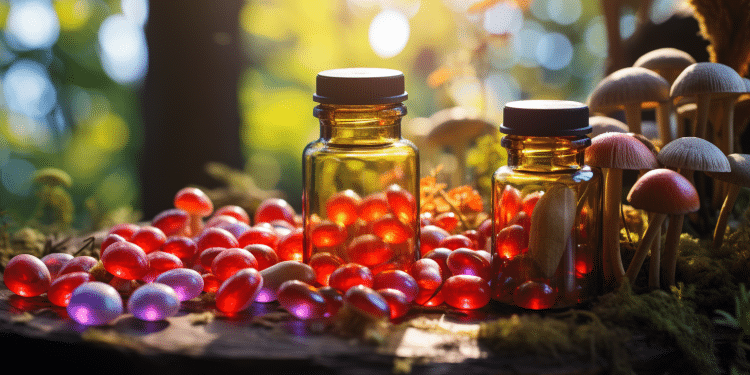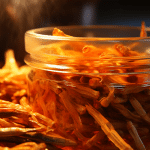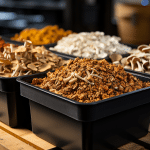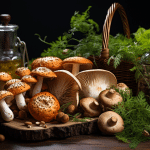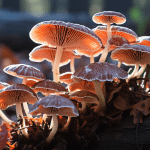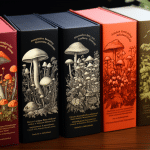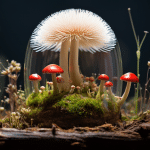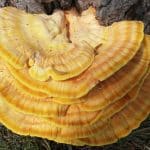Mushroom Capsules: Everything You Need To Know
If you’ve been researching about consuming more mushrooms for your health, you’ve undoubtedly heard about mushroom extracts and powders.
Unlike many mushroom powders available in supermarkets, these capsules aren’t meant to enhance the flavor of meals.
Yes, you may use your mushroom powders in a variety of delectable dishes.
Capsules are a no-hassle, no-fuss, no-prep alternative. They’re just packed with mushroom power on the go!
Mushrooms are undoubtedly one of nature’s most amazing superfoods, and mushroom capsules (nope, not magic mushrooms) are a fantastic way to get all of the benefits of mushrooms.
What Are Mushroom Capsules?
Many mushrooms are poisonous; however, some are both edible and medicinal.
Some mushrooms, out of all the edible varieties, are wonderful for adding to a stir fry or side dish.
Shiitake, portobello, white button mushrooms, porcinis, and a variety of other varieties are all delicious, so they’re simple to include into your meals.
Other mushrooms, on the other hand, have higher levels of phytonutrients and antioxidants, but they aren’t very delicious.
Functional or medical mushrooms are those high in beta glucans and other vital components, such as reishi, turkey tail, chaga, and many others.
Instead of fresh, you may purchase extracts of these medicinal mushrooms that are easily inserted into capsules.
Alternatively, you may purchase fresh or dried mushroom powder and make the capsules yourself!
These mushrooms don’t contain any psilocybin, so you won’t get high. You’ll just get good health and immune-boosting qualities.
You can quickly add beta glucans, potassium, B vitamins, and key antioxidants to your supplement regimen with medicinal mushroom capsules.
What Are Mushroom Capsules Made From?
Not all capsule and powder mushroom products are created equal.
If you want to truly reap the advantages of mushrooms, choose extracts from the complete fruiting body.
Many mushroom varieties are produced by mycelium, which grows in rice grain, not to be confused with the fungus that causes botulism. The final product only contains trace amounts of the compounds you want and includes a lot of starch.
The raw mushrooms are carefully dried and extracted with hot water, after which they are refined into a fine powder through “spray drying,” a technique that utilizes high-pressure pumps to extract the mushrooms. The process is simple: mix one part manufactured mushroom powder with nine parts water. The end result is a potent mushroom powder that contains all of the compounds found in a typical mushroom supplement.
What About The Actual Capsules?
Again, it is dependent on who you obtain your mushroom capsules from.
Some manufacturers will utilize low-cost capsules comprised of any sort of gelatin, such as beef, pork, or vegetable-based.
The best choice is to seek for goods that are comprised of pullulan in capsules.
The primary function of pullulan is to give structural support and structure to the noodles. It’s made from fermented tapioca, which is gluten-free, starch-free, and non-GMO.
Pullulan is also vegan, halal, and kosher by nature.
It also aids in preventing your mushroom extract from breaking down as a result of exposure to sunshine and air.
Are Mushroom Capsules Organic, Vegan, or Keto Friendly?
What about specific nutritional needs, such as vegans?
The capsules themselves depend on the manufacturer’s instructions and the material used in making them.
Vegetarian capsules aren’t necessarily vegan or halal since they could have been produced in a facility that handles pork products.
For the mushroom powders, again, it depends on a few factors.
Look for organic seals of approval on mushroom products to help you decide whether the mushrooms are safe for consumption.
With some of the manufacturers we feature on our site, all mushroom products are created from the fruiting body, organic, vegan, non-GMO, gluten-free, and made from organic pullulan capsules.
Mushrooms are ideal for the keto and paleo diets as well.
You’ll eat extracts, which are concentrated versions of the fungus. This makes your mushroom pills ideal for people on a restricted diet.
Avoid These Ingredients
The highest quality mushroom capsules are produced from organic mushrooms and pullulan shells.
Keep an eye on ingredient lists for fillers like brown rice, mushroom mycelium on grain, or wheat to avoid.
Some brands will also add what’s called a flow aid to the supplement.
Have you ever attempted to pour flour or cocoa powder into a cup? It doesn’t exactly flow, does it? To make the capsuling process easier, some producers include flow aids. Flow aids aren’t inherently bad; however, the extra substances are something to be cautious of.
In other words, with flow aids, you don’t always know what you’re ingesting, so it’s best to avoid them if possible. Similarly, just because something is vegetarian does not automatically make it healthy.
The bottom line is to seek for non-hypromellose, silicon dioxide, or microcrystalline cellulose-free organic mushroom capsules.
6 Medicinal Mushrooms You Should Buy In Capsules
Functional mushrooms, on the other hand, have more bio-available polysaccharides and antioxidants for immune support, since all mushrooms are beneficial to one’s health and antioxidant activity.
1. TURKEY TAIL
The immune-boosting properties of the Red Turkish Tail, also known as the Turkey Tail, have earned it a reputation as one of the most popular mushrooms for this purpose.
The beta-glucans in turkey tail have been studied for their anti-cancer effects.
2. LION’S MANE
The Lion’s Mane mushroom is most commonly taken for brain health, including mental clarity, focus, and memory. Lion’s mane may also help heal damaged nerves.
Many people report that Lion’s Mane has a soothing effect as well. Lion’s Mane is one of the few medicinal mushrooms that is also a delicious gourmet variety. So, if you can find it fresh and enjoy cooking, this mushroom should definitely be on your list.
3. CHAGA
Chaga, on the other hand, doesn’t appear to be much of a mushroom. – It’s not. Chaga is high in anti-oxidants and immune-boosting compounds.
4. CORDYCEPS
Cordyceps are a type of fungus that many athletes enjoy. Cordyceps, unlike typical mushrooms, does not resemble a plant. This odd-looking mushroom, on the other hand, may help increase stamina by improving blood flow throughout the body.
5. MAITAKE
Most of the studies on maitake focus on its ability to lower blood sugar levels and increase the immune system. Maitake is also a really delicious gourmet mushroom, so it may be used in cooking if you want to eat your functional mushrooms that way.
6. REISHI
Reishi is a beautiful fungus that has been used to promote good sleep, boost the immune system, and prevent heart disease. Reishi has a woody texture and is quite bitter. Reishi should be consumed in capsule form because of its bitterness.
Fruiting Body VS. Mycelium on Grain: What’s The Difference?
If you’re thinking about acquiring mushroom supplements, be wary of the real ingredients. “Mycelium on grain” is rather frequently seen in some brands, when the whole fruiting body should be used.
What does that mean?
The mycelium is grown on tiny fragments of grain, such as brown rice, rye, oats, or other cereal grains. If you saw it without knowing what it was, you wouldn’t realize it was a mushroom or fungus.
Instead, you want mushroom powders made from the entire fruiting body. It also contains more bio-available antioxidants and phytonutrients.
With hot water, high-quality producers will extract important nutrients from the whole fruiting body and dry the powder. It is necessary to use hot water extraction since certain pieces of mushroom cell wall can’t be digested.
Not only are you missing out on nutrients, but the majority of your product is brown rice filler when companies fill their goods with mycelium on grain. The mycelium isn’t extracted from the grain; it’s all ground up and encapsulated.
Mycelium is often known as cultivated oats, freeze-dried brown rice, or mycelial biomass. In the end, you want mushroom extracts that are made from actual mushrooms; so double-check the list of ingredients!
How To Make Your Own Mushroom Capsules
If you’re a do-it-yourselfer, you can get organic mushroom powders made from the whole fruiting body, a capsule maker, and capsules. You may also purchase fresh or dried mushrooms, which you can grind together with a coffee grinder to make your own powder.
It’s also quite time-consuming to create your own capsules.
You have to:
- Separate your capsules top from bottom
- Add each side to the capsuling machine
- Measure and add the mushroom powder
- Insert the powder into the capsules
- Pack the capsules
- Add more mushroom powder and spread again
- Pack the capsules again
- Put your finished capsules away and clean up
Don’t have time to do this every week? No problem.
You can checkout some of the best mushroom supplements available on the market today by visiting one of the banners on the right side of the screen, or checkout the different supplement and powders available from amazing brands by visiting the other pages on our site found in our menu at the top of your screen.
Mushroom Capsule Dosing
The average person eats about one half to two grams of mushroom powder extract each day.
The typical dose ranges from one to four capsules. However, your dosage is determined on your personal health requirements and any medical problems you want to treat.
Always, consult with a health care practitioner to figure out how much mushroom powder you should take each day and which species is best for you.
To Wrap Up
Mushrooms are similar to nature’s multi-vitamin. While adding more mushrooms to your diet is simple, taking a pill made from organic mushroom powders is even simpler.
Additional Resources:
